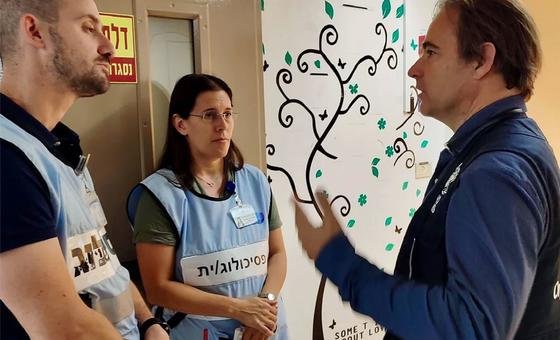These frontline workers include ambulance drivers, health workers and forensic teams who identify the dead. They all witnessed the horror and brutality of those attacks with their own eyes, which left them deeply shocked.
With the support of the European Office of the UN Health Agency – WHO, an organization, Mashiv Ha Ruch, provided mental health and psychological support.
The organization’s name means “bringing back the spirit” and it provided this support through workshops where workers were encouraged to talk about and process their trauma.
The organization’s founder, Yaal Kravitz, said he founded the group just days after the Oct. 7 attacks because he had an idea of how to help these aid workers.
the workshop
After the October 7 attack, many of the relief service volunteers suffered from insomnia, chronic stress and anxiety, and high levels of depression and anxiety, which had lasting effects on the workers and their families. work place
Mashiv Ha Rukh’s workshops were held in the desert, away from the hustle and bustle of everyday life, where participants were encouraged to share their experiences.
Daniel Shermon, co-founder of the organization, said that initially no one was interested in talking about their experiences.
So initially it was difficult to convince them to do so, but as they attended these workshops, people started hearing about these sessions from their peers which helped them forget their traumatic experiences.
Oz Tal, a frontline support worker on the day of the October 7 attack, said the workshop “gave him the language to describe his shock and express his emotions.”
Oz Tal said, “Firstly, when I ask volunteers to come to this workshop, they say they are fine. They don’t need anything. “They don’t want to come to this workshop.”
“But during the workshop, when we started talking about our feelings, talking about our problems, other people started doing the same. At that moment, the atmosphere of the room is instantly created.”
event
Soroka Medical Center is about 25 miles from Gaza. 680 patients were admitted there within 16 hours after the October 7 attack. Of these, 120 patients were seriously injured.
The WHO said many of the workers had close relatives killed in the attacks or lived in the area where the attacks took place.
Dr. Soroka Medical Center Emergency Department Director. Dan Schwarzfuss said that if these workers had not been strong, they would not have survived this tragedy.
“I knew I had to find something that would help keep them strong,” Dr. Dan Schwarzfucht says.
He said the therapy given to these workers through this workshop has strengthened their relationship with the medical center staff.
“Colleagues who previously didn’t want to talk about their experiences are now speaking up because they’ve seen other workers do the same,” says Dr. Dan Schwarzfuss
Reach more people
Mashiv ha Ruach has helped nearly 1,000 people through its workshops since its inception in 2024.
“We started Mashiv Ha Ruach under the best of circumstances,” says co-founder Shermon. But the truth is that people need it and will continue to need it for years to come.”
Founder Kravitz says they were able to reach more people with their partnerships with health organizations.
He said, “We are proud that this tolerance initiative is the only one in Israel to be recognized by the World Health Organization. For this we thank the Ministry of Health of Israel. “This partnership has been invaluable, and I would like to thank WHO.”
In addition to supporting Mashiv HaRukh, WHO has also supported the initiative of Mosaic, another non-governmental organization in Israel.
Supported by religious leaders in the Jewish and Muslim communities, the program connects people to appropriate mental health care resources, instills encouragement and hope, and reduces hesitation about treatment.

